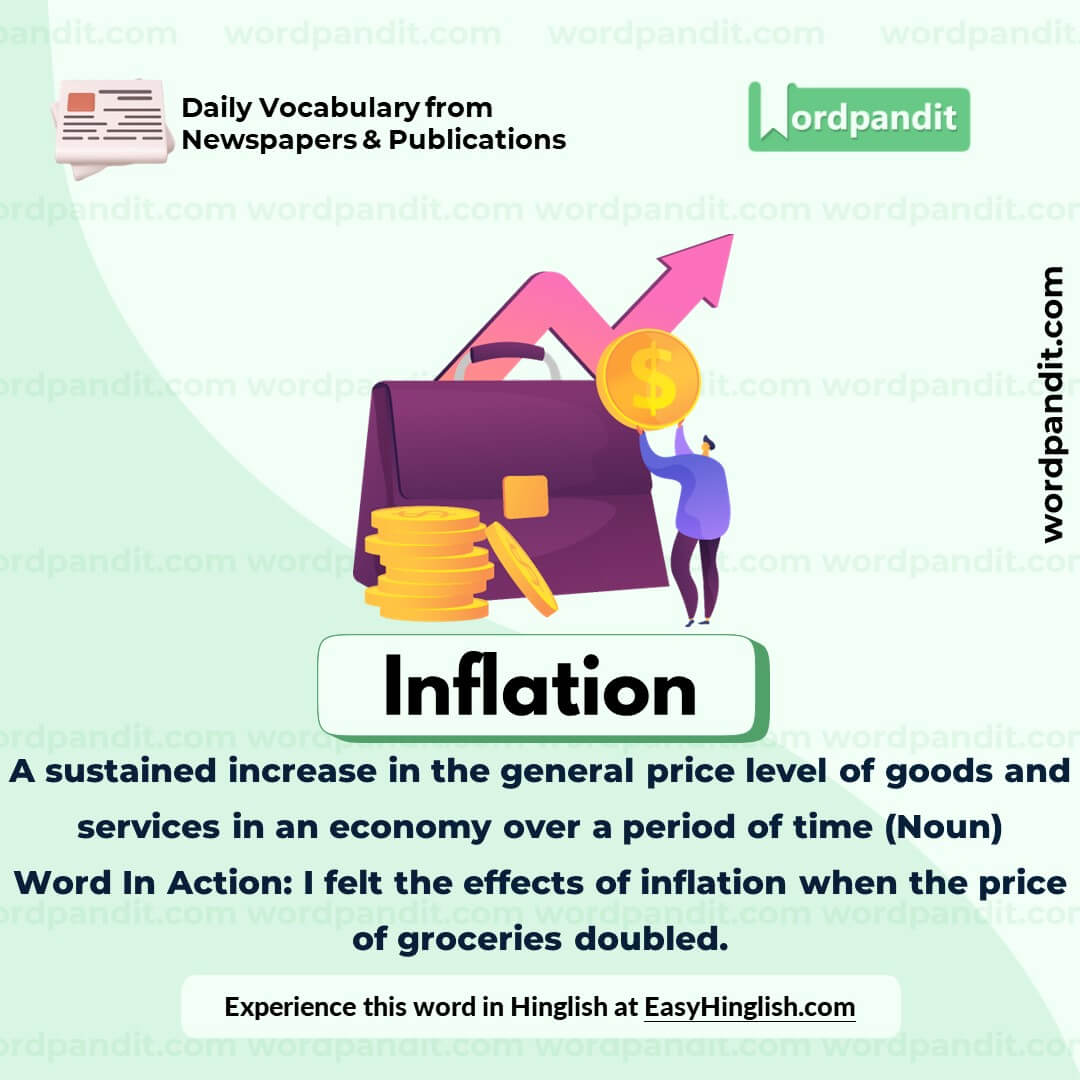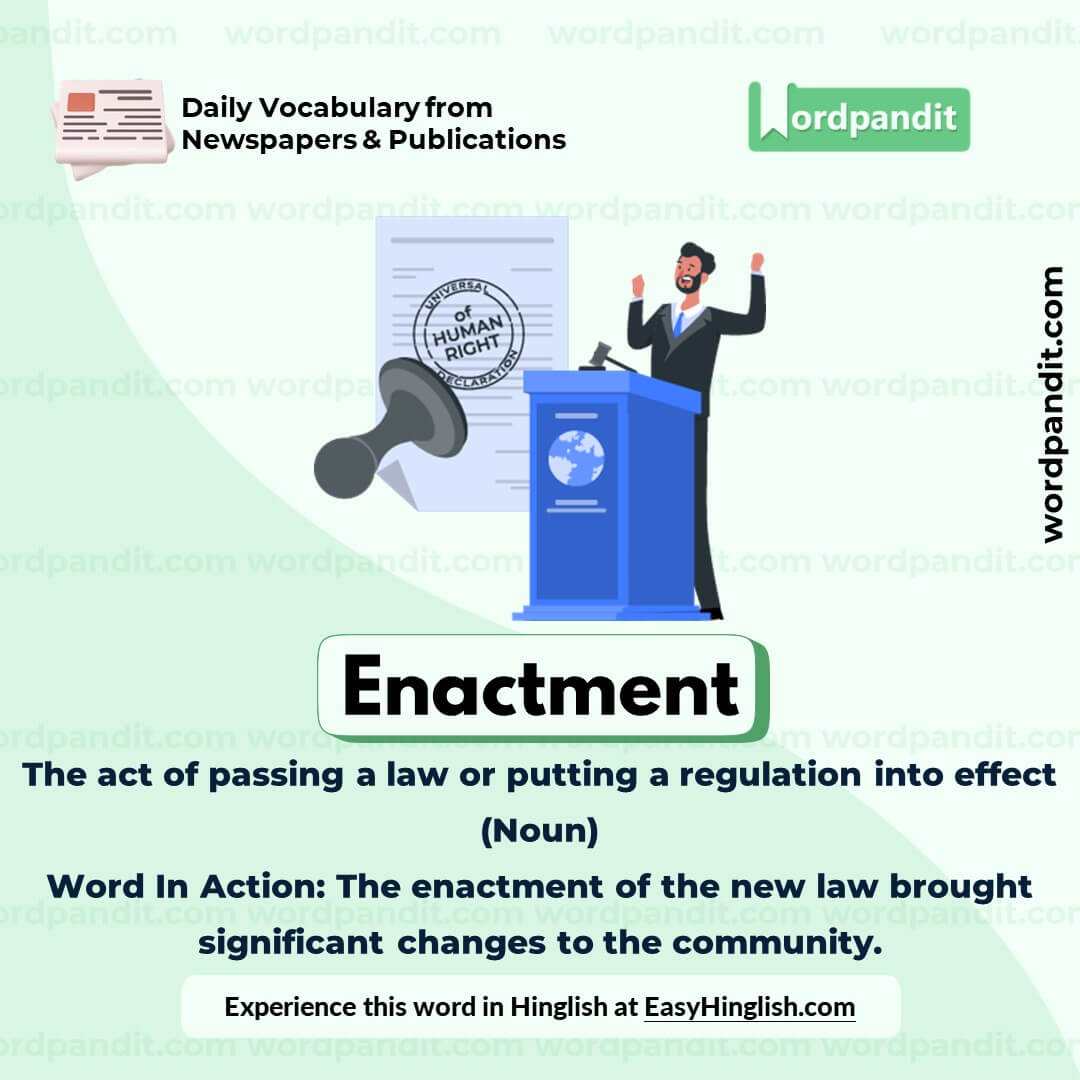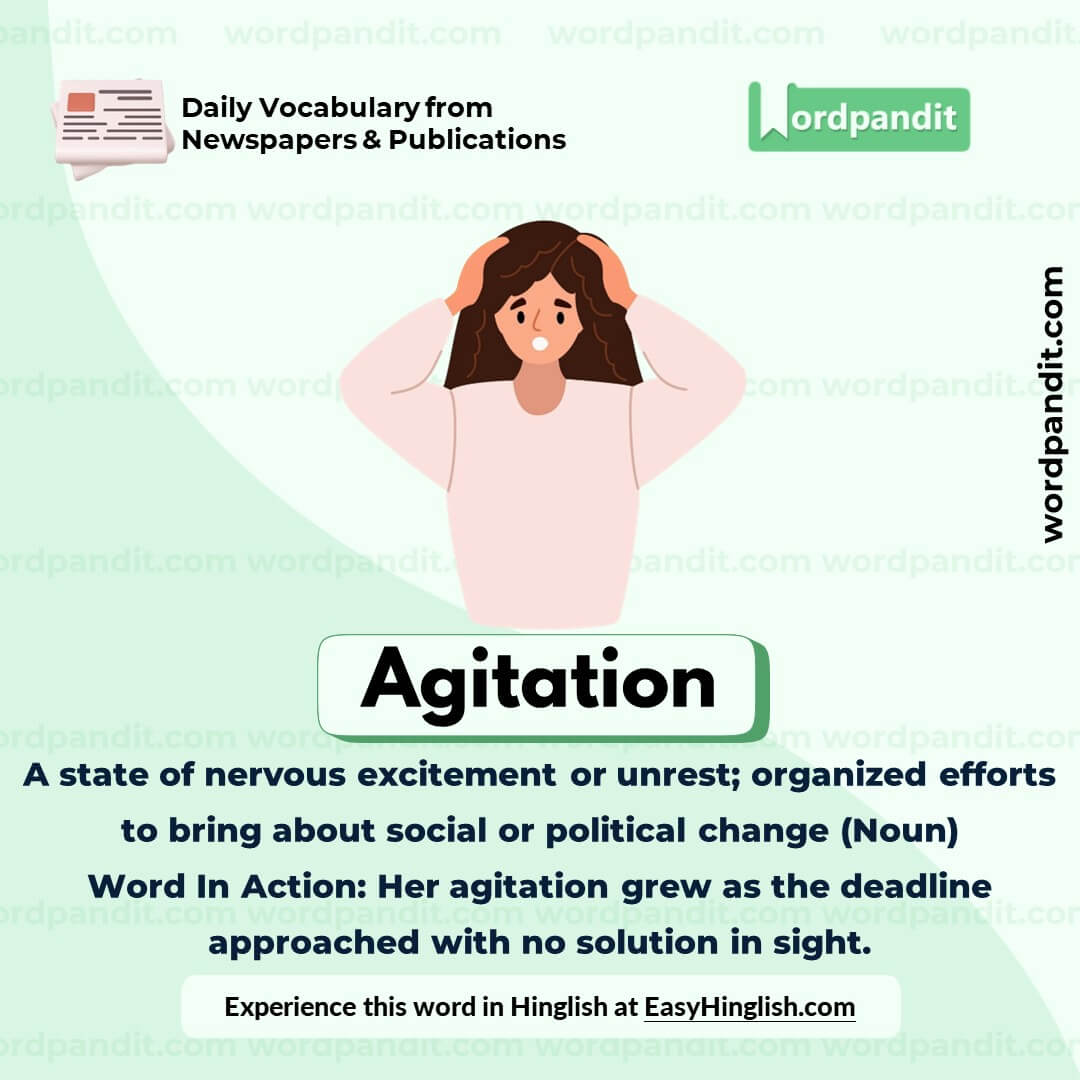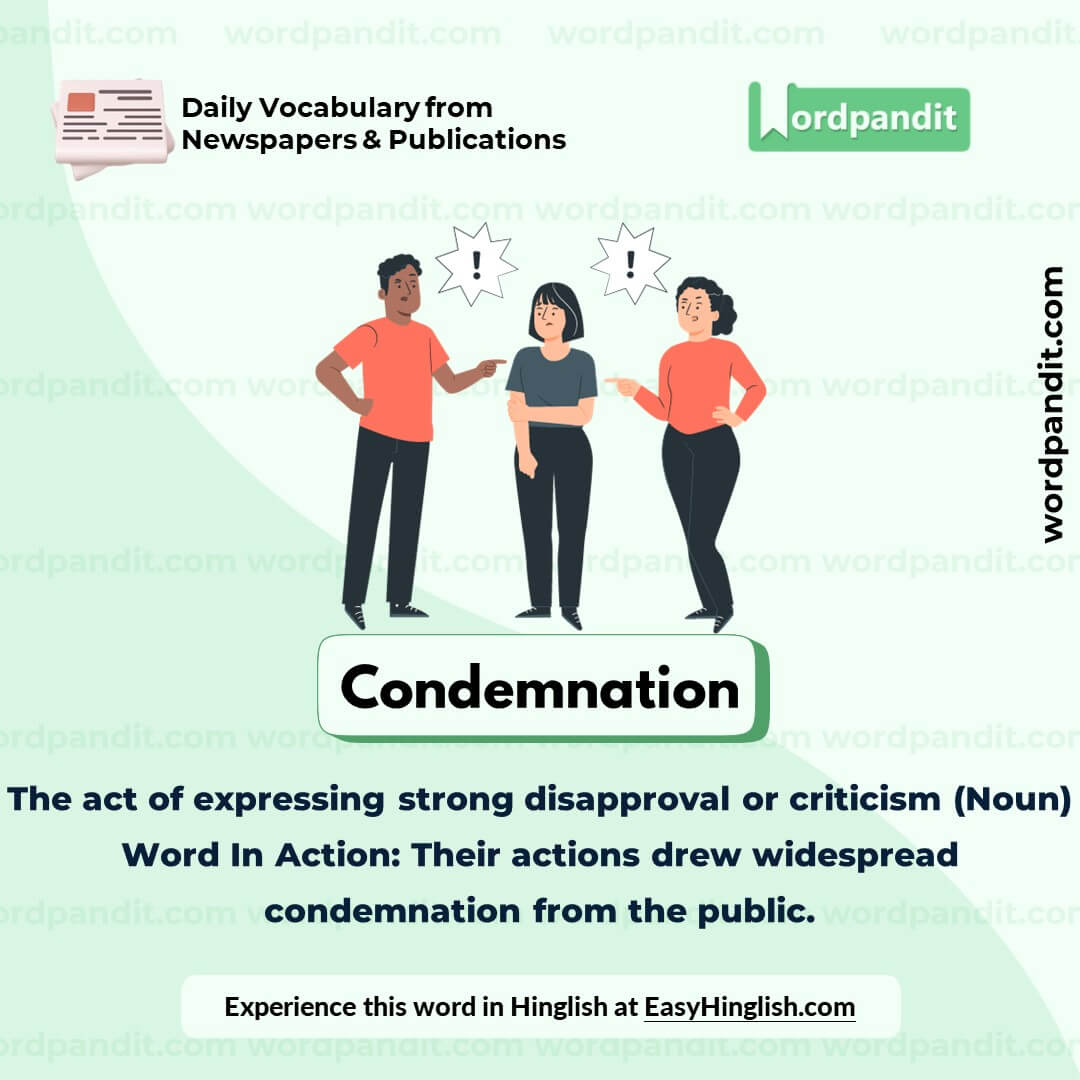Daily Vocabulary from Indian Newspapers and Publications
Welcome to Wordpandit’s Indian Vocabulary Hub
At Wordpandit, we understand the importance of staying rooted in the local context while expanding your language skills. This section focuses on enriching your vocabulary with words and phrases drawn from India’s leading newspapers and publications, ensuring you're learning vocabulary that is practical, relevant, and uniquely Indian.
Why Indian Sources Matter
We believe that the best way to master any language is by immersing yourself in local content. That’s why we carefully curate vocabulary from top Indian publications, including:
- The Hindu
- The Times of India
- The Economic Times
- Hindustan Times
- Live Mint
- The Indian Express
- And many others...
Stay Updated, Stay Relevant
With daily updates from Indian news sources, you’ll be consistently learning words that reflect the trends and shifts in Indian society and culture. Our focus is to provide vocabulary that enhances your understanding of the language in an Indian context.
How Wordpandit Supports Your Goals
Whether you’re preparing for exams, aiming to improve your professional communication, or simply want to stay connected with the latest Indian vocabulary, Wordpandit is here to guide you every step of the way.
Learn with a Practical Approach
Our interactive learning methodology includes real-world examples, engaging activities, and context-specific usage to ensure that every word becomes part of your active vocabulary.
Dive into Indian Vocabulary Today!
Why Choose Wordpandit?
Practical Learning: Focus on words you'll actually encounter in real-world reading, enhancing your comprehension and communication skills.
Diverse Content: From current affairs to scientific breakthroughs, our varied sources expose you to vocabulary across multiple domains.
Effortless Integration: Make Wordpandit a part of your daily routine. Just a few minutes each day can significantly boost your lexicon over time.
Your Path to Vocabulary Mastery
- Visit our Daily Vocabulary section regularly
- Explore new words and their usage in context
- Practice incorporating these words into your own writing and speech
- Track your progress as your vocabulary expands
Start Your Journey Today
Embark on your vocabulary enhancement journey with Wordpandit. By consistently engaging with our daily posts, you'll build a robust vocabulary that serves you well in academic, professional, and personal contexts.
Remember, a word a day keeps linguistic limitations at bay. Make Wordpandit your daily companion in the quest for vocabulary excellence!
WORD-1: Inflation
Context:
"RBI Policy: The Monetary Policy Committee (MPC) has kept the repo rate unchanged at 6.5 percent amid high inflation and a GDP slump." - The Indian Express
Explanatory Paragraph:
Inflation refers to the general increase in prices of goods and services over a period of time, which reduces the purchasing power of money. It can be caused by demand exceeding supply, higher production costs, or external economic factors. Managing inflation is critical to maintaining economic stability and ensuring that the cost of living remains affordable.
Meaning: A sustained increase in the general price level of goods and services in an economy over a period of time. (Noun)
Pronunciation: in-FLAY-shun
Difficulty Level: ⭐⭐⭐ Intermediate
Etymology: From the Latin word "inflatio," meaning "a blowing up or swelling," first used in an economic context in the 19th century.
Synonyms & Antonyms:
Synonyms: Price rise, cost increase, economic growth pressure
Antonyms: Deflation, price stability, economic stagnation
Usage Examples:
- High inflation eroded the purchasing power of the average consumer.
- The government introduced measures to curb inflation and stabilize the economy.
- Inflationary pressures are often a result of increased demand in the market.
- The central bank is closely monitoring inflation trends to adjust monetary policy.
Cultural Reference:
"Inflation is as violent as a mugger, as frightening as an armed robber, and as deadly as a hit man." - Ronald Reagan
Think About It:
How can central banks balance inflation control with promoting economic growth?
Quick Activity:
List three ways inflation impacts your daily life. Discuss how these changes affect your purchasing decisions.
Memory Tip:
Think of "inflate" as blowing up a balloon—the balloon’s size increases, just like prices increase during inflation.
Real-World Application:
Understanding inflation helps you make informed financial decisions, like choosing investments that outpace inflation or adjusting savings plans to maintain purchasing power.
WORD-2: Fortnight
Context:
"His effigy along with that of Nehru was burnt in a meeting in Delhi’s Ram Leela ground on December 12, 1949, almost a fortnight after the adoption and enactment of the constitution." - The Wire
Explanatory Paragraph:
A fortnight is a term used to describe a period of two weeks, or fourteen days. It is commonly used in British English and has historical roots in agriculture and early calendars where time was often measured in weeks and half-months.
Meaning: A period of two weeks or fourteen days. (Noun)
Pronunciation: FORT-night
Difficulty Level: ⭐ Easy
Etymology: Derived from the Old English "feowertyne niht," which literally means "fourteen nights."
Synonyms & Antonyms:
Synonyms: Two weeks, half-month
Antonyms: Single week, month
Usage Examples:
- We planned a trip to the countryside for a fortnight in July.
- The results of the test will be announced in a fortnight.
- She decided to stay at her grandmother’s house for a fortnight to help with the chores.
- Their biweekly meetings occur once every fortnight.
Cultural Reference:
The word "fortnight" frequently appears in classic British literature, such as in Jane Austen's novels, where social gatherings and events were often planned over a fortnight.
Think About It:
Why do you think some languages like English have specific words for a two-week period, while others do not?
Quick Activity:
Write a short paragraph describing what you could accomplish in a fortnight if you had no distractions.
Memory Tip:
Remember that "fort" in "fortnight" refers to fourteen, making it easy to recall it means fourteen nights or two weeks.
Real-World Application:
The term "fortnight" is widely used in scheduling and planning in countries like the UK, making it useful for understanding international communication, especially in business or travel.
WORD-3: Enactment
Context:
"His effigy along with that of Nehru was burnt in a meeting in Delhi’s Ram Leela ground on December 12, 1949, almost a fortnight after the adoption and enactment of the constitution." - The Wire
Explanatory Paragraph:
Enactment refers to the process of officially making a proposed law or regulation into a legal statute. It signifies the formal adoption and implementation of rules or laws by a governing body, such as a parliament or legislature. Enactment ensures that the rules are legally binding and enforceable.
Meaning: The act of passing a law or putting a regulation into effect. (Noun)
Pronunciation: en-AKT-ment
Difficulty Level: ⭐⭐⭐ Intermediate
Etymology: From the Old French "enacter," based on Latin "enactare," meaning "to decree" or "to proclaim."
Synonyms & Antonyms:
Synonyms: Legislation, implementation, ratification
Antonyms: Repeal, annulment, abrogation
Usage Examples:
- The enactment of the new environmental law was celebrated by activists worldwide.
- Delays in the enactment of the bill have caused frustration among stakeholders.
- After months of debate, the parliament moved forward with the enactment of the policy.
- The enactment process requires approval from both legislative houses.
Cultural Reference:
The enactment of the United States Constitution in 1789 is considered a pivotal moment in history, setting a framework for modern democracy.
Think About It:
How does the process of enactment ensure that laws reflect the needs and values of a society?
Quick Activity:
Identify a law recently enacted in your country. Write a short note on its importance and how it impacts citizens.
Memory Tip:
Break "enactment" into "en-act-ment" to remember it as the process of making something "act" or come into effect legally.
Real-World Application:
Understanding enactment is essential for students of law, policy, and governance, as it helps explain how laws shape societal functions and individual rights.
WORD-4: Agitation
Context:
"Karpatriji Maharaj, one of the leaders of the agitation, according to Guha, expressed his condemnation of the Bill on the ground that it was piloted by Ambedkar." - The Wire
Explanatory Paragraph:
Agitation refers to a state of heightened emotional disturbance or an organized effort to push for change, often in a political or social context. It can describe both personal emotional turmoil and collective actions, such as protests or movements, aimed at influencing policies or decisions.
Meaning: A state of nervous excitement or unrest; organized efforts to bring about social or political change. (Noun)
Pronunciation: aj-ih-TAY-shun
Difficulty Level: ⭐⭐⭐ Intermediate
Etymology: From the Latin "agitare," meaning "to move or drive," and later used in English to describe both physical movement and emotional or political unrest.
Synonyms & Antonyms:
Synonyms: Protest, unrest, disturbance, turmoil
Antonyms: Calm, peace, serenity, order
Usage Examples:
- The workers’ agitation for better wages drew national attention.
- She could sense agitation in his voice as he explained the situation.
- The student agitation led to significant changes in university policies.
- In times of political unrest, agitation often becomes a tool for change.
Cultural Reference:
The Civil Rights Movement in the United States involved widespread agitation against racial segregation and discrimination, leading to landmark changes in laws and societal attitudes.
Think About It:
Can agitation always be justified as a tool for social change, or does it depend on the context and methods used?
Quick Activity:
Write a list of three historical agitations and describe the outcomes they achieved.
Memory Tip:
Think of "agitate" as stirring up emotions or actions, much like how you might stir a pot to create movement or excitement.
Real-World Application:
Understanding agitation helps in analyzing social movements and protests, making it a valuable concept in political science, history, and sociology.
WORD-5: Condemnation
Context:
"Karpatriji Maharaj, one of the leaders of the agitation, according to Guha, expressed his condemnation of the Bill on the ground that it was piloted by Ambedkar." - The Wire
Explanatory Paragraph:
Condemnation refers to the expression of strong disapproval or criticism, often on moral or ethical grounds. It signifies a judgment against something deemed wrong, harmful, or unacceptable, and is commonly used in both personal and public contexts to voice opposition.
Meaning: The act of expressing strong disapproval or criticism. (Noun)
Pronunciation: kon-dem-NAY-shun
Difficulty Level: ⭐⭐⭐ Intermediate
Etymology: From the Latin "condemnare," meaning "to sentence or blame," combining "con-" (intensifier) and "damnare" (to damage or inflict loss).
Synonyms & Antonyms:
Synonyms: Criticism, censure, denunciation, reproach
Antonyms: Praise, approval, commendation, endorsement
Usage Examples:
- The leader's harsh condemnation of the policy sparked widespread debate.
- Her condemnation of the unethical practices won her widespread support among activists.
- The journalist faced public condemnation for spreading false information.
- The condemnation of the controversial law united people across different communities.
Cultural Reference:
The United Nations has frequently issued condemnations of human rights violations worldwide, highlighting the global response to injustice.
Think About It:
Is condemnation more effective when paired with constructive solutions, or does it serve its purpose as a standalone response?
Quick Activity:
Think of a time when you strongly disapproved of something. Write a short paragraph explaining why you felt that way.
Memory Tip:
Connect "condemnation" with "condemn" and think of a judge declaring something wrong or unacceptable.
Real-World Application:
Condemnation is frequently used in politics, activism, and media to highlight issues, making it a critical word in analyzing public discourse and societal values.
















